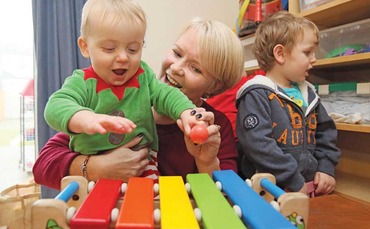
As children's centres prepare to accept more two-, threeand four-year-olds for free places in September, Enfield Council is developing alternative provision for babies.
Working with the council's educational psychology service and the childminding team, I have helped to modify the existing Baby Matters in Enfield (B-ME) training programme and make it bespoke to home-based childminders.
Never underestimate the work of childminders. It is hard but rewarding work -and in Enfield we aim to do all we can to support our childminders.
In 2007, the Northamptonshire Baby Room Project demonstrated that babies' brains develop at an amazing rate and that we can do much to feed into this with stimulating activities, language, music and love.
Building on the ideas and discoveries of the Baby Room project, Enfield Council is now offering a unique pilot programme for 17 Enfield childminders.
We are teaching them about babies' brain development and the huge importance of sensitive and responsive care.
The B-ME project started in 2011, focusing on the baby rooms in children's centres and day nurseries, but it has now widened its focus to include childminders.
Educational psychologists, a specialist health visitor, teaching professionals in early years and now professionals in childminding have teamed up to create a course to support and expand the learning experiences for childminders and the babies in their care.
Babies are born with 25 per cent of their brains already formed and by age three this has risen to 80 per cent. So it is not surprising that we are helping to make the most of this rapid development in young children in our programme.
ATTACHMENT NEEDS
A cross-party commitment from all major political parties signed up to The First 1001 Critical Days: the importance of the conception to age two period, recommending support for childminders, nurseries and childcare settings focusing on the attachment needs of babies and infants.
Our project B-ME does this by offering three sessions consisting of one full day and two half days spread over the year, with follow-up visits from childminding support co-ordinators, with two of the visits involving the educational psychologist who leads the course.
Each session includes theories and an opportunity to discuss how these translate into practice, both in relation to how we respond and care for babies and the changes we can make to the physical environment to promote emotional well-being, interaction, play and learning.
Maria Harwood (pictured below), a childminder with ten years' experience, looks after five young children with her mother, known as Gran Nan.
She says, 'We care for the children between the hours of 7.30am and 6pm. We play with them - our den is full of toys, games, building bricks, puzzles and imaginative games. And we always find time for songs, stories and rhymes.
'One-year-old Bacchus is the youngest and is already a social, happy baby able to play with the older children and alert to everything going on. I thought I knew childminding very well, but I really enjoyed the first session of this project.'
She adds, 'We saw a video that showed how babies begin to make sense of the world from birth and how we can help them. I began to see things from the baby's point of view.'
PLAY AND LAUGHTER
As part of the course, we ask childminders to keep a regular diary recording their observations. The first session focuses on brain growth, use of high visual stimulation and what can be learned through this.
Vicki Haley has been childminding for a year and during this time ten-month-old Michael has thrived. She is finding B-ME very inspiring.
'It is a privilege to look after Michael,' she says, 'I am proud that his parents have trusted me to look after their most precious possession -and I love it. After the first session I just could not wait to get to the local pound shop and buy ribbons and colourful items so that I could show Michael tactile and sensory experiences. I am looking forward to the next sessions.'
Throughout the course our childminders make observations as the babies in their care develop. We provide them with practical resources, which include a box of carefully chosen materials such as varied textiles and scrunchy paper and ideas to stimulate interest and discovery.
The second session of the course is about emotional development, explaining crying and how we respond to it, exploring colours and how they affect emotions; and play resources - making items for individual babies.
In the third session, the focus is on babies' play and laughter. This recognises the importance of play and interaction with others. It is about positive experiences and the effect they have on brain development.
Childminders are helping Enfield Council to evaluate the course. Councillor Ayfer Orhan, Enfield Council's cabinet member for children and young people, says, 'They have been asked to take photos, record their observations and to play a full part in this very special programme. We believe there is so much to discover in caring for babies and building a professional base for childminders.
'We want to enhance their work and recognise their competence and see how that translates into children who will be ready and confident to start school.'
Sandie Gardner is deputy manager of Enfield Council's childcare and early years team.
Further information









